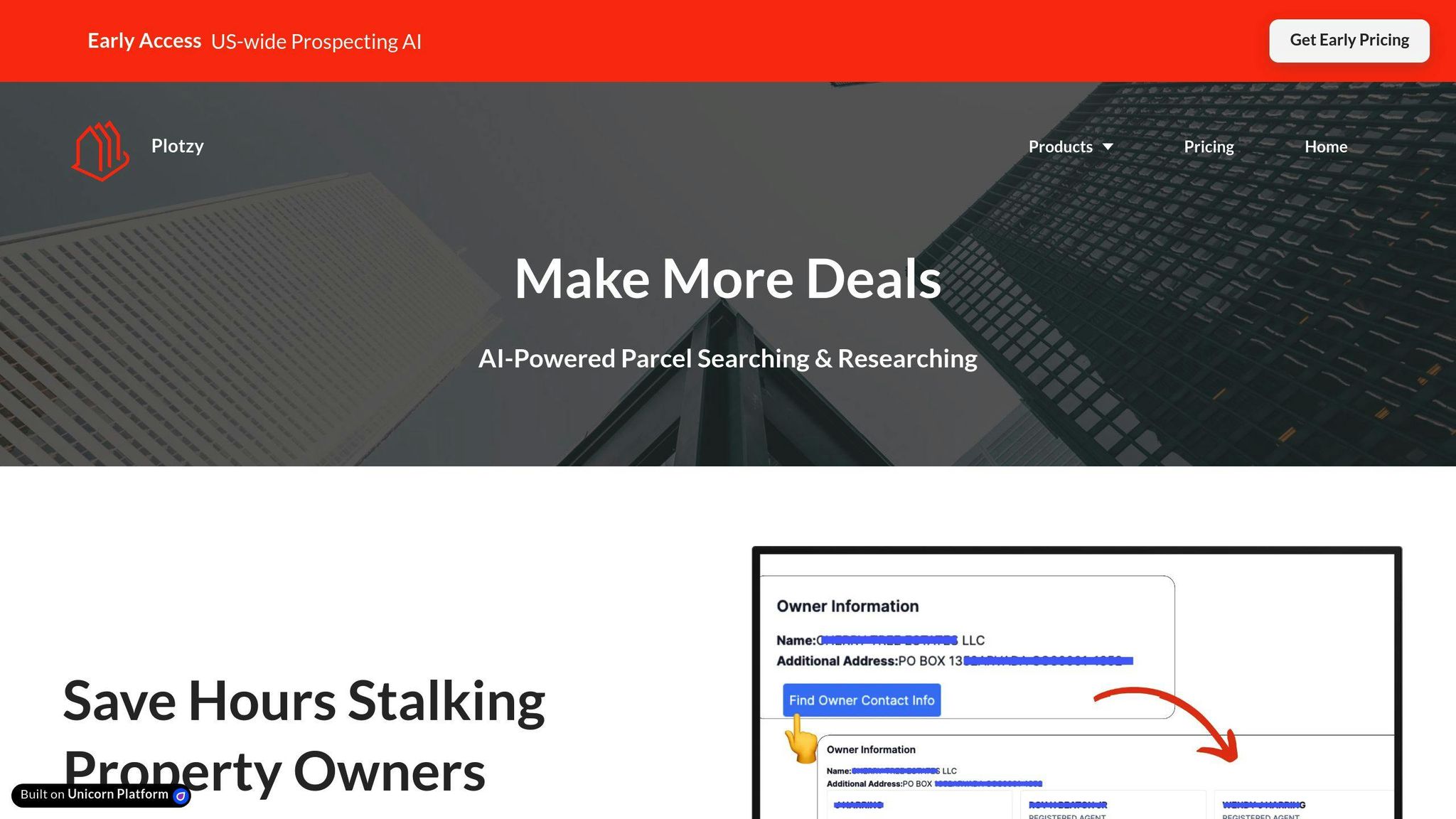Finding property owner contact information is essential for real estate professionals. Here's how you can do it:
- AI Tools: Platforms like Plotzy ($85/month) and Reonomy ($300/month) provide ownership details, zoning data, and verified contact information. These tools save time and simplify property research.
- Public Records: Use county tax records and municipal websites to access verified ownership details like names, mailing addresses, and property specifics. These are often free but may require cross-checking for accuracy.
- Zoning Filters: Tools like Plotzy help narrow down properties based on zoning and permitted use criteria, aligning with your investment goals.
- Data Verification: Always cross-reference AI tools with public records to ensure the information is accurate and up-to-date.
Quick Comparison
| Method | Cost | Benefits | Best Use Case |
|---|---|---|---|
| Plotzy | $85/month | Zoning filters, unlimited searches | Quick zoning and parcel filtering |
| Reonomy | $300/month | Ownership histories, contact info | Complex ownership structures |
| Public Records | Free | Verified legal details | Confirming ownership accuracy |
Combining AI tools with public records ensures faster, more accurate property research. Start with AI for efficiency, then verify through official databases for reliability.
How to Lookup Property Owners Online FREE
How AI Tools Simplify Property Research
AI-powered platforms have transformed the way real estate professionals search for and verify property ownership details. By analyzing large datasets and automating tedious research tasks, these tools make property searches faster and more precise.
Using Plotzy to Find Property Owners

Plotzy, priced at $200/month, offers unlimited property searches, quick zoning information, and advanced parcel filtering. These features save professionals countless hours of research. One of its key benefits is the ability to provide instant zoning answers, helping users evaluate property feasibility without navigating complicated municipal databases. The platform's parcel filtering system, powered by AI, allows users to pinpoint properties that meet specific criteria, simplifying the entire research process.
Reonomy: A Tool for Ownership and Contact Information
Reonomy, starting at $300/month, focuses on ownership structures and market analytics, making it a strong choice for more complex transactions. It provides detailed ownership histories and property insights.
Key features of Reonomy include:
- Automatically identifying LLC structures and tracking ownership changes
- Verified contact details for key decision-makers
- Market trend analysis to improve prospecting efforts
Both Plotzy and Reonomy integrate with CRM tools, helping streamline workflows for property research. For commercial real estate professionals handling extensive property portfolios, these platforms enhance data management and lead scoring, allowing them to concentrate on building relationships and closing deals instead of manual research.
Using Public Records and Local Databases
AI tools like Plotzy and Reonomy make property research easier, but public records are still crucial for confirming ownership details. These records offer legally verified information that supports and strengthens tech-based research.
Finding Ownership Details in County Tax Records
County tax records are a dependable way to uncover property ownership information. Many counties have online databases where you can search by address or property ID. These databases typically provide details like owner names, mailing addresses, property specifics, and tax histories. Just visit the county’s website, enter the property details, and review the information provided.
Searching Municipal Websites for Property Data
Municipal websites have grown into valuable resources for property research. Many cities now host online property databases that are regularly updated. These platforms often include owner names, mailing addresses, tax details, and other property-related information. Updates are usually made monthly or quarterly, ensuring relatively current data.
"Between 50% to 70% of contacts in a Realtor's database do not have a physical property address, highlighting the need for accurate property ownership information."
To get the most out of public records research:
- Use both county and city-level databases for a broader view
- Cross-check information between county and municipal records to confirm accuracy, focusing on data updated within the past 3–6 months
- Document your sources and note the dates you accessed the information
Public records are a key part of property research. When combined with AI tools, they can help you work more efficiently and ensure greater accuracy in your findings.
sbb-itb-11d231f
Tips for Faster and More Accurate Property Research
Streamlining property research while maintaining accurate data is now easier thanks to zoning filters and AI-powered verification tools. These technologies have reshaped how we locate and confirm property owner details.
Using Zoning and Permitted Use Filters
Platforms like Plotzy simplify property searches with zoning filters, helping you zero in on properties that meet specific criteria, such as commercial or industrial zones. Start with broad categories, then narrow your focus by permitted use to align with your investment plans.
Here’s how to make the most of these filters:
- Begin with general zoning categories (e.g., commercial, residential, industrial).
- Narrow your search using permitted use details.
- Target properties that fit your investment strategy.
- Keep an eye on future zoning changes and development opportunities.
After identifying potential properties, the next critical step is verifying the contact information to ensure it's accurate and actionable.
Verifying Contact Information for Accuracy
Having the right contact information is essential for reaching property owners. Cross-referencing multiple sources can help confirm that the data is up-to-date. For instance, Reonomy offers a database starting at $300/month, providing regularly updated contact details that can be checked against public records.
Here’s a sample verification workflow:
| Step | Source 1 | Source 2 |
|---|---|---|
| Owner Name | County Tax Records | Plotzy |
| Mailing Address | Municipal Records | Property Deed |
| Contact Details | AI Tools | Public Records |
"The integration of AI tools into property research workflows has reduced verification time by up to 70% while improving accuracy rates", according to Reonomy's official documentation.
Make it a habit to verify ownership data regularly, focusing on updates from the past three months. Tools like Likely.AI can fill in missing details, making your outreach efforts more efficient.
Other Tools and Resources for Property Research
In addition to standard property search platforms, there are specialized tools designed to make finding and verifying property owner information easier. These tools combine software features with AI-driven automation to save time and improve accuracy.
Custom Software for Real Estate Professionals
Custom software centralizes ownership data, making it easier to access accurate contact details quickly. Here’s a comparison of some top platforms:
| Platform | Key Features | Best For |
|---|---|---|
| AscendixTech | CRM integration with automated updates | Large brokerages |
| HouseCanary | Ownership verification and property valuation | Investment firms |
| PropertyRadar | Localized owner data and ownership history | Individual agents |
AI Tools for Automating Real Estate Tasks
AI-powered platforms simplify the process of researching and verifying property owners. For example, Likely.AI predicts potential sellers and updates contact details, EliseAI cross-references owner data for accuracy, and Tidio automates communication with property owners.
These tools bring several advantages:
- Automated Data Collection: Continuously scans multiple sources to keep owner details up-to-date.
- Predictive Insights: Helps identify likely sellers early.
- Integrated Verification: Validates information across different databases for consistency.
When choosing AI tools, look for options that offer regular updates and can integrate with your current systems. This ensures your owner data stays accurate and your workflow remains efficient.
Using Technology to Find Property Owners
Modern technology has transformed the way property ownership research is conducted, turning what used to be a lengthy process into something far more efficient. By combining AI tools with traditional resources, real estate professionals can now access ownership details quickly and with greater accuracy.
Here’s a breakdown of how different research methods work together:
| Research Method | Benefits | Key Metrics |
|---|---|---|
| AI Platforms | Real-time updates, automated access | 50-70% better contact accuracy |
| Public Records | Verified ownership details | Comprehensive ownership history |
| Municipal Databases | Local insights, zoning information | Specific property details |
The best results come from using AI platforms for initial searches, verifying findings through public records, and enriching the data with insights from local municipal databases. This combination ensures both speed and accuracy while keeping the data reliable.
When choosing technology solutions for property research, focus on tools with:
- Regular data updates (weekly or monthly)
- Cross-source comparison features
- Automated verification processes
- CRM integration options
"Between 50% to 70% of contacts in a Realtor's database do not have a physical property address, highlighting the need for accurate property ownership information."
FAQs
How can I find out who owns a property in the US for free?
You can use public records, like county tax assessor databases, to find property ownership details for free. By searching with a property address or Assessor's Identification Number (AIN), you can access information such as owner names, mailing addresses, and tax histories.
Here’s a breakdown of what public records typically provide:
| Information Type | Source | Availability |
|---|---|---|
| Owner Name | County Tax Records | Always Available |
| Property Address | Municipal Database | Always Available |
| Mailing Address | Tax Assessor Records | Usually Available |
| Assessment History | County Records | Always Available |
These records are accessible through county tax assessor offices, municipal websites, and county clerk offices. While they are reliable, searching through public records can be time-consuming, especially if you're handling multiple properties. Cross-referencing this data with AI tools can make the process faster and more efficient.
Keep in mind that public records are a great starting point for property research. Combining them with AI-driven tools can help streamline the process and improve accuracy, especially for professionals in commercial real estate.
Lastly, ensure you're following the Fair Credit Reporting Act (FCRA) when using consumer information obtained from public records.


